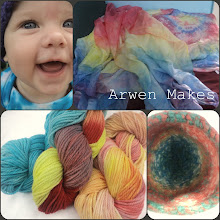I think, after a lot of mental meandering, I can summarise myself into two sentences. Don't sweat the small stuff - children are children, and do childish things. AND Use the best possible way of asking for co-operation when you need to. Now I'm going to try to expand that and outline my feelings about discipline and my ideals for dealing with my own children.
Bear with me, I'm not perfect and as imperfect as even my ideals are I don't manage to stick to them all of the time. If something sounds a bit wishy-washy then either a) I may be being permissive/neglectful, let's talk about it! or b) you may not be very trusting of children, hey, let's talk about that too. :) I'm not offended if you think I'm unrealistic/naive/strict/authoritarian - but I'd like to hear your views (be gentle, assuming positive intent is for grown-ups too).
So here we go.
What I think I would tell myself, were I ever to write myself a handbook.
- Don't sweat the small stuff. Children do childish things and almost all of those things are, by nature, small stuff. When the red tide sweeps in, time out *yourself* and get a cup of chamomile tea. Say that you're going to calm yourself down, keep it light, and don't imply that you're withdrawing yourself *because* of the child. Cuddles are not a reward. Even if your child just did something that upset you a lot you will both be healed more by a hug than by withdrawing love.
- Don't insist on uneccessary rules that you don't even know the reason for. Sensible rules are about safety or protecting the feelings of others - but don't look for excuses, be honest. "Stay on the pavement!" is a rule for safety, "Let mummy cut things out for you," (at four or five) is maybe just a reason to get safety scissors or loosen control on the project or both. Let children have a genuine choice, including over things that you'd rather control - but then actually follow through and let them get on with what they want to attempt, don't argue and correct!
- Assume that their actions or emotions have a reason behind them and then ask yourself if making them (more) unhappy is going to help them feel better and act better. Clue: The answer is always no. Witholding a drink from a tantruming child is unlikely to make the big feelings stop (it may force the desperately thirsty child to supress their upset but it WILL come out later). If you'd give a drink when they weren't shouting, give a drink now. Consistency isn't more important than love.
- Once something is done (ie usually a mess) it is done. It won't get undone by yelling, and the emotional mess will come next. Easier to look at the problem - and the problem isn't the child. Oh look, paint on the floor. Let's deal with that together. Assume positive intent, it will help you stay calm. And if it *was* on purpose then it was for a still for a reason, one that was logical to the child - whatever the reason was the solution is not harmed by dealing with it gently.
- "No" is not an instruction. In fact "no" can often be done away with unless it's an answer to a question that you can't say "yes" to (for REAL safety reasons). The best way to tell a child to stop something in an emergency is to say "STOP". No is ambiguous; what exactly is the no to (breathing, walking this way, walking at all, swishing my dress as I do so, looking at that pebble, singing that song)? In the time it takes you to add something specific your child might not actually be stopping. "No" blocks exploration. "No" blocks conversation (which blocks relationship).
- Use positive words to ask for co-operation. Why not *start* with the specific - and phrase it in terms of what you actually need? A mild, "I need you to come *this* way," is less likely to result in a mad dash for freedom. Try it - "Stop shouting!" becomes "Quiet voices please," and "Get off the grass!" becomes "ON the path!"
- A reminder in advance - and the first time something is going wrong - can be helpful. In this family we... I like to see... I expect... The rules can be flexible, but let's be honest, we never want to see the baby being sat on and we always expect that gentle hands will be used. Explaining your expectations for behaviour is the way to go - children are more reasonable than we give them credit for and they *want* to co-operate. Explain (all the time) the reasons for what you're doing or plan to do. Talk in terms of how other people feel, how you feel, how it feels when... You don't need to go into too much depth, depending on the age of child. If one child is hurting another sometimes all that is needed is, "It looks like that is making him feel sad."
- There is no reason for riding roughshod over big feelings. Repeat back to the child what they seem to be feeling - when they are small this can give them the words they need, when older it is saying to them that you hear them and you care. "I understand" sounds inauthentic; "It doesn't matter," and "It's OK," are dismissive! Try, "It looks like you are feeling hurt/angry(frustrated)/lonely/tired" (HALT) or "I hear that you don't like it when..." Questions may be unanswerable but with older children asking how they feel about something or why something is bothering them might give you some insights. If you get it wrong they'll start to correct you when they get used to the idea that you're listening and trying to understand.
- All feelings are allowed, but sometimes some expressions of them aren't. It's OK to ask a child to tell you something in a normal voice when they are whining or if you can't make out the words. If a child is simply crying too much then slow down and give them space, it's not that they'll forget what was wrong if you let them calm down in their own time. Don't correct feelings you don't like - eg denying that they can possibly hate someone or something.
- Give warnings when something (ie a transition) needs to happen. Say, "In five minutes we will need to..." and explain why. When it gets closer ask for the child to get ready, or tidy up, or say goodbye, whatever. Then give them space to do it. Offer genuine help. Make more of the day negotiable.
- Always re-evaluate. Be flexible. At any point you can change your mind - not because you are undependable but because you can be depended on to be fair even when the rules aren't. Every situation is different as is every child (and often they themselves change from day to day). And never be afraid to reconnect and appologise. It's good for our children to see that we're not perfect and that we hold ourselves to a standard of behaviour. It's good for them to be the powerful ones sometimes (role play games and physical play are good for this) - to be the one who wins or the one who needs to have their forgiveness asked!
- Make kindness the priority. The relationship is the thing, not the rules.
Subscribe to:
Post Comments (Atom)










No comments:
Post a Comment
Penny for your thoughts? :)